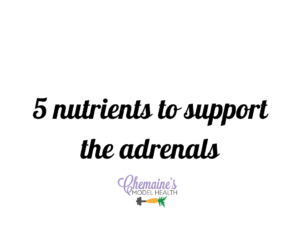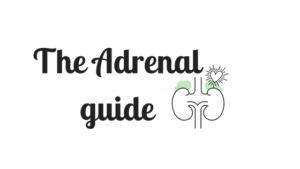There is a term that floats around that you may have heard of “adrenal fatigue”?!
Whether or not it is a term thats agreed on, or that it even exists, in the health and medical world is irrelevant… what is relevant is that many people have some understanding of what this term relates to and even believe that they have experienced “adrenal fatigue” at one stage or another themselves.
To most people adrenal fatigue means their adrenals are fatigued, tired, or exhausted. Basically they are running on fumes or burnt out, both emotionally and physically. You may also hear it referred to as “adrenal exhaustion”, “adrenal dysfunction”, or “adrenal insufficiency”, but this last one is generally only used in refence to Addison’s disease.
To understand this you need to understand that your adrenals are small bean shaped organs that sit on top of each kidney. They are responsible for pumping out glucocorticoids (your stress hormones adrenaline, cortisol and aldosterone). When you have perceived stress, the adrenals pump out theses stress hormones in response…well to help you ‘respond’. First you get “adrenaline” to fight, and then you get “cortisol” to flight… survive.
But when you are constantly exposed to stress, this can be physical, emotional, or mental stress, so “chronic stress”. The adrenals can get taxed or worn out, and we start to get imbalances and irregularities with these hormones, which has a ripple effect to other hormones and biological systems in the body. This then causes other issues to be experienced in the person like fatigue, burnout, mental health issues, anxiety, depression, sleep issues, motivation issues, weepiness, irritability, uncontrollable eating (especially sugar and junk food), issues with weight management, menstrual issues, low libido, digestion and gut issues, cholesterol issues, thyroid issues, systemic inflammation, aches and pains, compromised immunity, and more. You basically feel rubbish, like your stuck in a hole, and your body doesnt function well, let alone optimally (which is what many of us want).
This chronic stress response can also cause insulin resistance, so blood sugar issues in people with chronic stress is not uncommon, and this of course is a contributing factor to weight gain with stress.
So on this page, and in the adrenal guide;
I hope to educate you on why you might be feeling a certain way (burnt out etc.) and how you can help yourself overcome this and get out of said metaphorical hole.
It IS chronic stress or your perceived chronic stress adn the response, that wears the body down. It drives up that inflammation and insulin resistance which impairs the thyroid and metabolism, so you can create energy. It crushes the immune system and hormonal pathways, and as for staying consistent and adhering to a weight loss diet… well you will need superhero type discipline, otherwise forget about it. I bet your saying by now “yes this is me!”. Of course it is, because its all of us at one stage or another. This is the enviroment we live it. We get hit by stress from every angle. No one can escape it.
First thing to do is sleep and rest. Sleep is #1 when it comes to recovering the adrenals.
Next we want to pull back on our exercise routine for a few weeks, moving more into restorative regenerative work. Then we want to address our nutrition. Removing any foods that may be a stress or to the body like; food sensitivities, gluten, dairy, alcohol, trans fats, and processed foods. We want to bring in a better nutrient dense eating template and replenish any depleted vitamins and minerals.
The mineral magnesium and B vitamins are the first to get depleted when one is exposed to stress.
 5 Nutrients to support the adrenals;
5 Nutrients to support the adrenals;
- B complex
- Magnesium citrate
- Vitamin C
- L Theanine (calms the nervous system)
- Phosphatidylserine (reduces cortisol)
Ashwagandha also gets talked a lot about when it comes to adrenal fatigue and stress. And this herb can be very efficacious. To lower elevated stress hormones you can use ashwagandha (preferably a standardized root and leaf form with 10% withanolides).
Ashwagandha is a stress adaptogen which brings the body back to homeostasis. Its also used in the event of adrenal fatigue, where you may be not producing enough cortisol. When your not producing enough cortisol, your going to be exhausted and get sick more often. This includes a weak immune system, poor thyroid health and even autoimmune issues. So by using ashwagandha we can bring the adrenals back to homeostasis. *Ashwagandha should not be taken during pregnancy and breastfeeding. Ashwagandha can influence sex hormones.
“Cortisol Manager” is an awesome option for those wanting to try something other then Ashwagandha. This product has been super effective in my clients looking to push down stress adn anxiety, a get a good nights sleep.
We will also need to support the body including circadian and hormonal rhythms (blood sugars will need to be address). We can do this with sunlight, a good bedtime routine, some adaptogens, and maybe some other supportive herbs and or nutrients. Then looking at inflammation and body weight. Do we need to lose body fat to push down inflammation or do we just focus on the inflammation.
There is obviously a lot, and I know a lot of my clients and followers have been waiting for this information. So I plan to have the Adrenal guide available for purchase ASAP. But in the meantime, please use the information on this page and the resources I provide in the education section of this site, my Facebook and Instagram pages, and my podcasts and videos on YouTube. There is lot of information across all my social media platforms, and of course if something doesn’t make sense or you have questions, please reach out.
More helpful resources;
Breathwork can be a great tool for calming the body and supporting the adrenals during times of stress. Feel free to download this FREE PDF The power of breathing properly .
Stress test Holmes Rahe stress scale test . This test/scale is used my medical and health professionals across the world. Takes 2 minutes to complete.
INSTRUCTIONS; Mark down the point value of each of these life events that has happened to you during the previous year. Then, add up all your points to calculate your final score.
WHAT DOES YOUR SCORE MEAN?
150 points or less = a relatively low amount of life change and a low susceptibility to stress-induced health breakdown
150 to 300 points = 50% chance of health breakdown in the next 2 years
300 points or more = 80% chance of health breakdown in the next 2 years, according to the Holmes-Rahe statistical prediction model.
All the best always!
Your model health coach,


